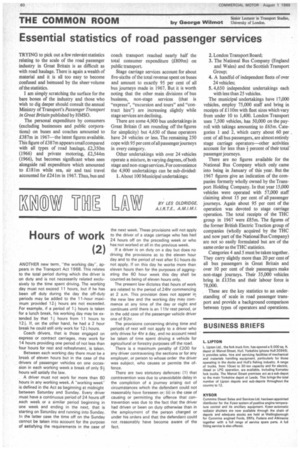Hours of work (2)
Page 62

If you've noticed an error in this article please click here to report it so we can fix it.
ANOTHER new term, "the working day", appears in the Transport Act 1968. This relates to the total period during which the driver is on duty and is not necessarily related exclusively to the time spent driving. The working day must not exceed 11 hours, but if he has been off duty during the day the off-duty periods may be added to the 11-hour maximum provided 121 hours are not exceeded. For example, if a period of 1+ hours is taken for a luncb break, his working day may be extended by that 1+ hours from 11 hours to 12+. If, on the other hand, he had a 2 hour break Fie could still only work for 12+ hours.
Coach drivers, that is those engaged on express or contract carriages, may work for '14 hours providing one period of not less than four hours for rest and refreshment, is taken.
Between each working day there must be a break of eleven hours but in the case of the drivers of passenger vehicles on one occassion in each working week a break of only 9+ hours will satisfy the law.
A driver must not work for more than 60 hours in any working week. A "working week" is defined in the Act as beginning at midnight between Saturday and Sunday. Every driver must have a continuous period of 24 hours off each week or a similar period beginning in one week and ending in the next, that is starting on Saturday and running into Sunday. In the latter case the time off on the Sunday cannot be taken into account for the purpose of satisfying the requirements in the case of the next week. These provisions will not apply to the driver of a stage carriage who has had 24 hours off on the preceding week or who has not worked at all in the previous week.
If a driver is on duty on a day but does no driving the provisions ac to the eleven hour day and to the period of rest after 5+ hours do not apply. If on this day he works more than eleven hours then for the purposes of aggregating the 60 hour week this day shall be counted. asbeing of eleven hours only.
The present law dictates that hours of work are related to the period of.24hr commencing at 2 a.m. This provision does not appear in, the new law and the working day may commence at any time of the day or night and continues until there is an 11 hr rest period, or in the odd case of the passenger vehicle driver one of 9+hr.
The provisions concerning driving time and periods of rest will not apply to a driver who only drives for 4hr a day, and no account need be taken of time spent driving a vehicle for agricultural or forestry purposes off the road.
There is a maximum penalty of £200 for any driver contravening the sections or for any employer, or person to whose order the driver was subject, who causes or permits the offence.
There are two statutory defences: (1) that contravention was due to unavoidable delay in the completion of a journey arising out of circumstances which the defendant could not reasonably have foreseen or; Iii) in the case of causing or permitting the offence that contravention was due to the fact that the driver had driven or been on duty otherwise than in the employment of the person charged or under his orders and that the defendant could not reasonably have become aware of the fact.


































































































